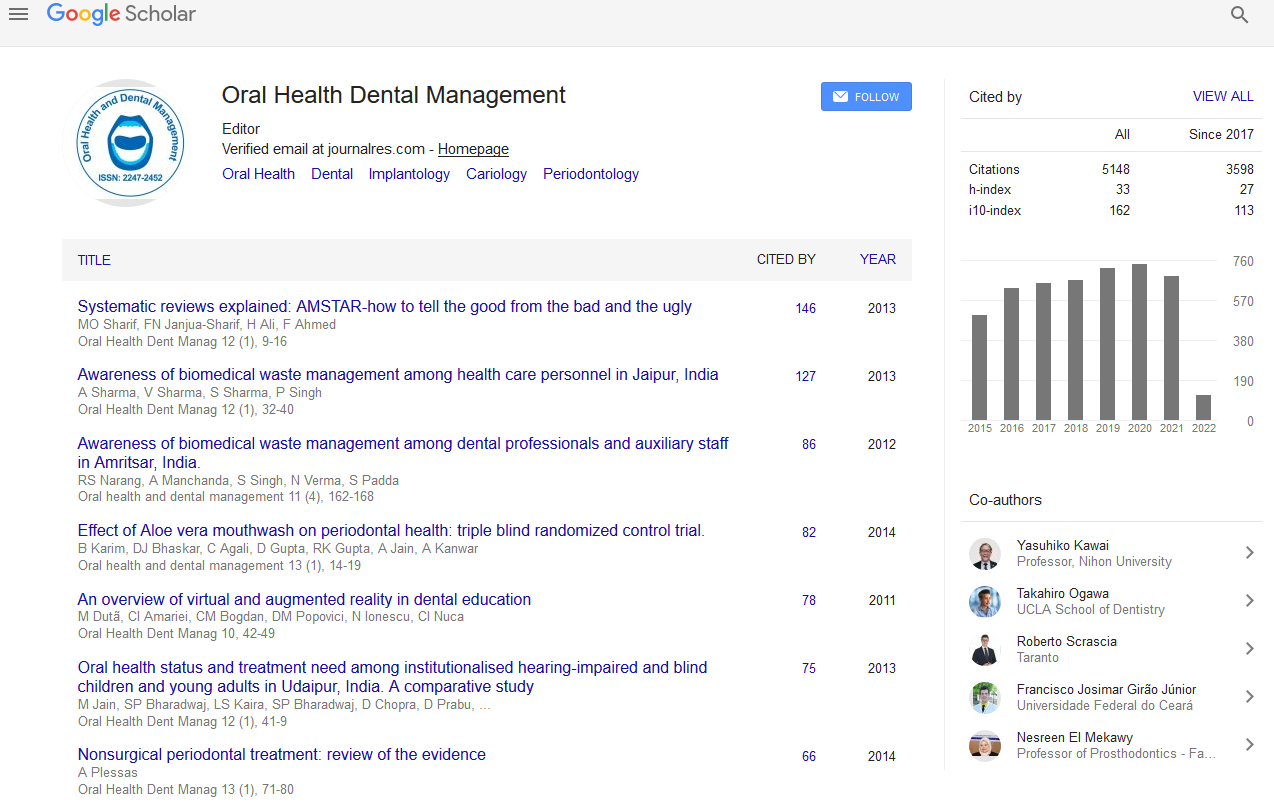Indexed In
- The Global Impact Factor (GIF)
- CiteFactor
- Electronic Journals Library
- RefSeek
- Hamdard University
- EBSCO A-Z
- Virtual Library of Biology (vifabio)
- International committee of medical journals editors (ICMJE)
- Google Scholar
Useful Links
Share This Page
Journal Flyer

Open Access Journals
- Agri and Aquaculture
- Biochemistry
- Bioinformatics & Systems Biology
- Business & Management
- Chemistry
- Clinical Sciences
- Engineering
- Food & Nutrition
- General Science
- Genetics & Molecular Biology
- Immunology & Microbiology
- Medical Sciences
- Neuroscience & Psychology
- Nursing & Health Care
- Pharmaceutical Sciences
In-vitro study of treatment modalities to minimize the effects of dental erosion
2nd International Conference and Exhibition on Dental & Oral Health
April 21-23, 2014 Crown Plaza Dubai, UAE
M Dehghan, A C Fitzhugh, D Tantbirojn and A Versluis
Accepted Abstracts: Oral Health Dent Manag
Abstract:
Objectives: This in-vitro study investigated the ability of four treatments to increase the hardening of tooth enamel initially softened by hydrochloric (HCl) acid, as found in patients with gastric reflux and bulimia. The treatments consisted of products that contain calcium, phosphate, and/or fluoride, and were compared with hardening by saliva alone. Methods: Extracted human molars were embedded in acrylic resin and polished. Vickers surface hardness (VH) was measured at each stage in the experiment. After VHbaseline, the teeth were bathed in a 10 mM HCl solution for 10 minutes to mimic regurgitated stomach acid, and VHsoftening was recorded. The acid-challenged teeth underwent treatment with the following products: 0. 05% sodium fluoride mouth rinse (ACT), 0. 4% stannous fluoride gel (Gel-Kam), casein phosphopeptide amorphous calcium phosphate (CPP-ACP) (MI-paste), fluoridated CPP-ACP paste (MI-Plus). Deionized water was used as control. Following treatment, teeth were bathed in human saliva (IRB #10-01122-XM) for one hour, and VHhardening was recorded. Statistical analysis was performed with ANOVA followed by Student-Newman-Keuls post-hoc tests (p=0. 05). Results: VH (mean?standard deviation) are presented in the table. Same superscript letter denotes hardness values that were not significantly different among experimental stages within the same group. VH significantly decreased after HCl-challenge in all groups. After re-mineralization, VH increased significantly in MI-paste and MI-Plus groups, but not in the Control, ACT, and Gel-Kam. Only MI-Plus recovered the baseline VH-value. Conclusions: Hardness recovery of enamel softened by HCl was minimal with saliva alone. The treatment that incorporated fluoride and calcium phosphate was most effective for enamel hardness recover.

